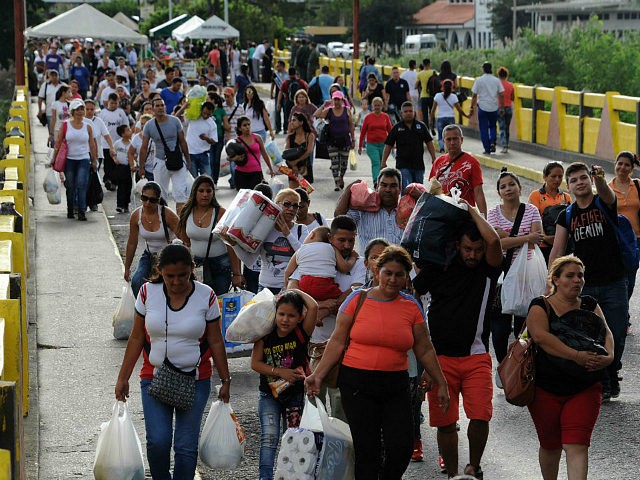The socialist government of Venezuela opened its western border with Colombia for 12 hours this weekend as a means of combatting growing food shortages in the nation. An estimated 35,000 took advantage of the opening to buy basic food items like sugar and flour and to visit relatives they were barred from seeing after a mass deportation last year.
The government of President Nicolás Maduro announced on Friday that the border would be fully open for those seeking to travel to Colombia from the border state of Táchira for 12 hours. Colombian newspaper El Tiempo reports that the line to cross the bridge into Cúcuta, Colombia began forming at 3 AM the morning before the event, with Venezuelans passing the time by chanting “holy land,” referring to the neighboring country, and counting the goods they were hoping to buy. Border patrol agents began to allow Venezuelans to cross the border at 5 AM local time.
“We don’t have anything to eat to give our children, so I don’t find it fair that the border remains closed,” one woman who crossed the border told El Tiempo. Those who managed to stock up during the limited time that the border remained open, however, appeared satisfied. “We bought rice, pasta, sugar, toilet paper, butter, everything we could bring back. We had enough for lots of stuff,” one father told the Spanish newswire service EFE. All expressed gratitude towards Colombian vendors for welcoming them to Cúcuta, with some carrying signs reading, “Colombia, thank you for your solidarity with Venezuela.”
Maduro issued the order to open the border less than a week after a group of an estimated 700 women, mostly mothers, crossed the border illegally in the same region, demanding free passage to buy food in Colombia. Border patrol troops did not impede the women’s passing as they prayed and chanted through security. The hundreds arrived in Colombia, bought food in an orderly fashion, and left.
EFE reports that the Chavista governor of Venezuela’s Táchira province, José Gregorio Vielma Mora, announced Maduro’s decision to open the border with the warning that the “Venezuelan right” had been planning a similar crossing to that last week to buy food. He did not identify any members of the Venezuelan anti-socialist opposition as having been involved in the border crossing.
The Colombian government has been receptive to opening the border to Venezuelans. President Juan Manuel Santos assigned Foreign Affairs Minister María Ángela Holguín to run an effort to convince Maduro to keep the border open permanently, as they were before last year. “We will not let our Venezuelan brothers suffer hunger and the necessities of lacking medicine,” Holguín said in remarks following the crossing last week.
The border between Venezuela and Colombia in Táchira state has been closed since August 2015, when Maduro asserted that it was necessary to close the border to prevent “smugglers” from selling food and goods from Colombia on the Venezuelan black market. Claiming that Colombian nationals were all involved in smuggling gangs, Maduro ordered the forced removal of over 1,000 Colombian nationals from their homes on the Venezuelan side of the border. The government seized their homes and sprayed them with the letter “D,” a sign that they were to be demolished. Colombians married to Venezuelans were not excused from the deportation measure, tearing many families apart. Reports rapidly began to surface that Venezuelan soldiers were sexually abusing Colombian girls being deported.
President Juan Manuel Santos of Colombia compared the deportations to “Nazi tactics” and threatened to bring Maduro to international court. He also made a personal visit to Cúcuta to welcome those deported back to their home countries.

COMMENTS
Please let us know if you're having issues with commenting.